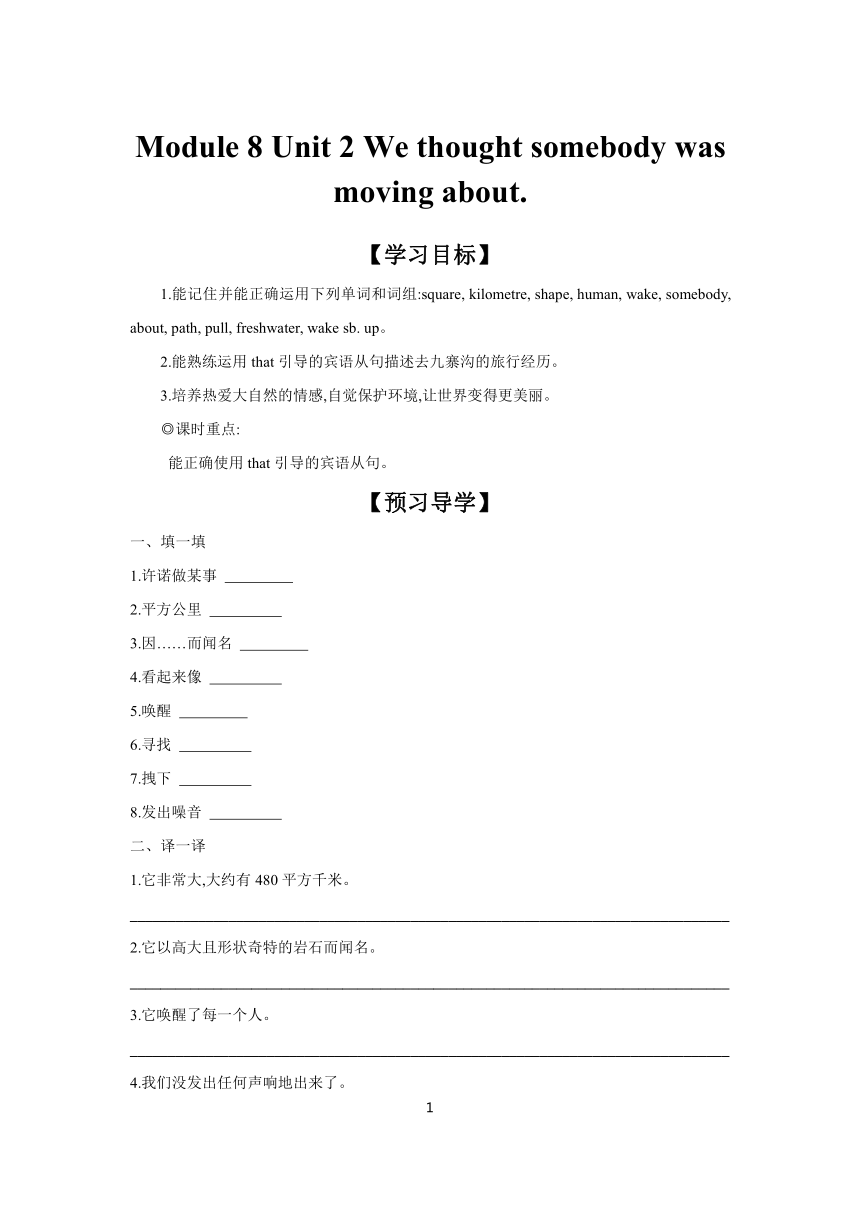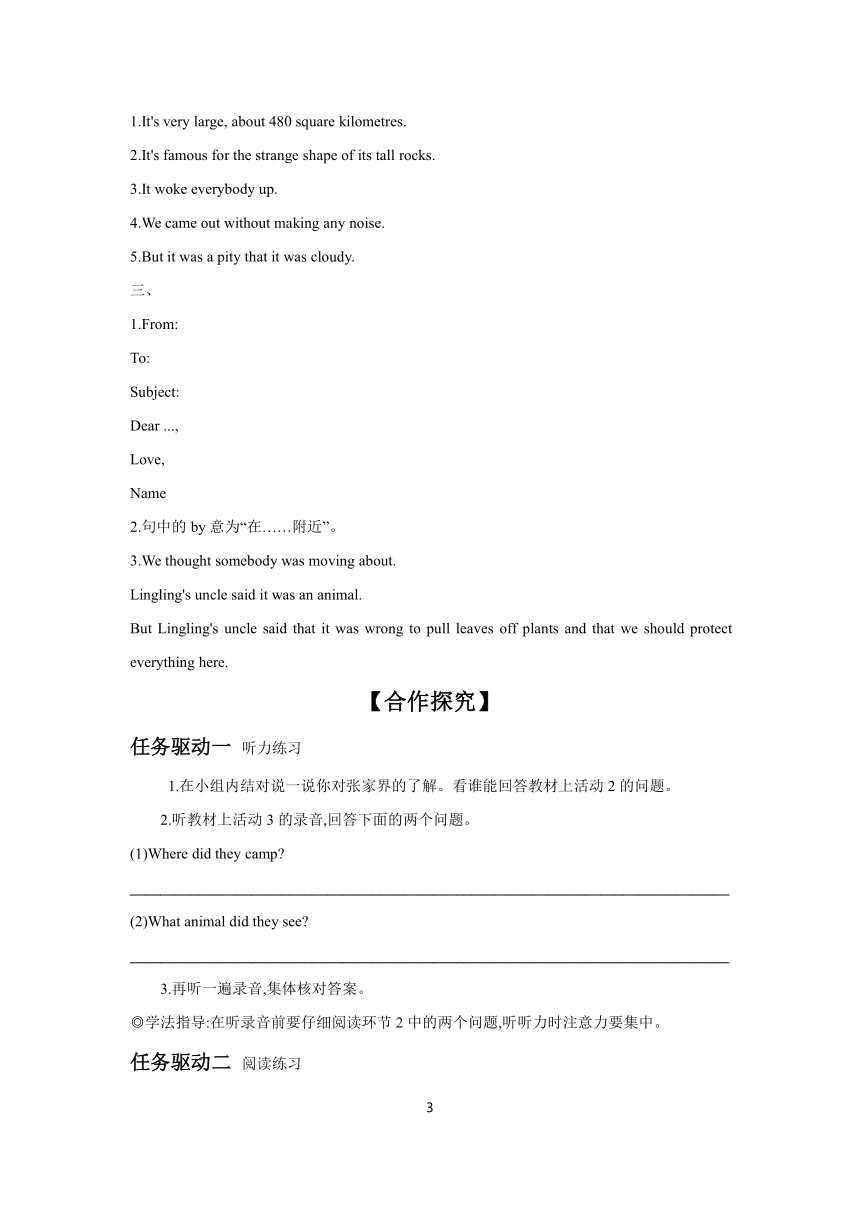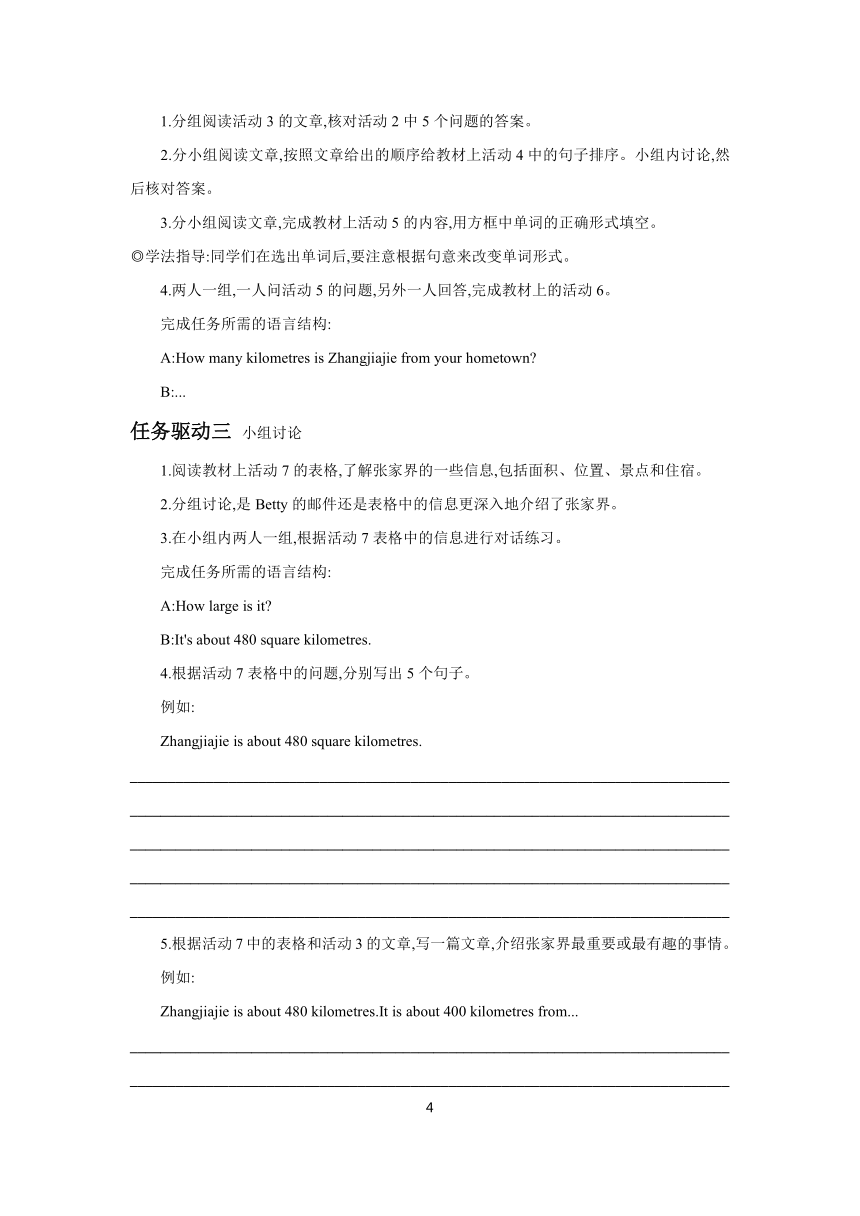Module 8 Unit 2 We thought somebody was moving about. 学案(含答案)
文档属性
| 名称 | Module 8 Unit 2 We thought somebody was moving about. 学案(含答案) |  | |
| 格式 | docx | ||
| 文件大小 | 26.3KB | ||
| 资源类型 | 教案 | ||
| 版本资源 | 外研版 | ||
| 科目 | 英语 | ||
| 更新时间 | 2024-02-27 21:59:38 | ||
图片预览




文档简介
Module 8 Unit 2 We thought somebody was moving about.
【学习目标】
1.能记住并能正确运用下列单词和词组:square, kilometre, shape, human, wake, somebody, about, path, pull, freshwater, wake sb. up。
2.能熟练运用that引导的宾语从句描述去九寨沟的旅行经历。
3.培养热爱大自然的情感,自觉保护环境,让世界变得更美丽。
◎课时重点:
能正确使用that引导的宾语从句。
【预习导学】
一、填一填
1.许诺做某事
2.平方公里
3.因……而闻名
4.看起来像
5.唤醒
6.寻找
7.拽下
8.发出噪音
二、译一译
1.它非常大,大约有480平方千米。
_______________________________________________________________________________
2.它以高大且形状奇特的岩石而闻名。
_______________________________________________________________________________
3.它唤醒了每一个人。
_______________________________________________________________________________
4.我们没发出任何声响地出来了。
_______________________________________________________________________________
5.但是很遗憾天气是多云的。
_______________________________________________________________________________
三、想一想
1.请写出电子邮件的写作格式。
_______________________________________________________________________________
_______________________________________________________________________________
_______________________________________________________________________________
_______________________________________________________________________________
_______________________________________________________________________________
_______________________________________________________________________________
◎学法指导:请认真阅读文章,掌握电子邮件的格式。
2.“Last night we camped by a small lake.”中的by是什么意思
_______________________________________________________________________________
3.请找出课文中包含宾语从句的句子。
_______________________________________________________________________________
_______________________________________________________________________________
_______________________________________________________________________________
【答案】
一、
1.promise to do sth.
2.square kilometre
3.be famous for
4.look like
5.wake up
6.look for
7.pull off
8.make noise
二、
1.It's very large, about 480 square kilometres.
2.It's famous for the strange shape of its tall rocks.
3.It woke everybody up.
4.We came out without making any noise.
5.But it was a pity that it was cloudy.
三、
1.From:
To:
Subject:
Dear ...,
Love,
Name
2.句中的by意为“在……附近”。
3.We thought somebody was moving about.
Lingling's uncle said it was an animal.
But Lingling's uncle said that it was wrong to pull leaves off plants and that we should protect everything here.
【合作探究】
任务驱动一 听力练习
1.在小组内结对说一说你对张家界的了解。看谁能回答教材上活动2的问题。
2.听教材上活动3的录音,回答下面的两个问题。
(1)Where did they camp
_______________________________________________________________________________
(2)What animal did they see
_______________________________________________________________________________
3.再听一遍录音,集体核对答案。
◎学法指导:在听录音前要仔细阅读环节2中的两个问题,听听力时注意力要集中。
任务驱动二 阅读练习
1.分组阅读活动3的文章,核对活动2中5个问题的答案。
2.分小组阅读文章,按照文章给出的顺序给教材上活动4中的句子排序。小组内讨论,然后核对答案。
3.分小组阅读文章,完成教材上活动5的内容,用方框中单词的正确形式填空。
◎学法指导:同学们在选出单词后,要注意根据句意来改变单词形式。
4.两人一组,一人问活动5的问题,另外一人回答,完成教材上的活动6。
完成任务所需的语言结构:
A:How many kilometres is Zhangjiajie from your hometown
B:...
任务驱动三 小组讨论
1.阅读教材上活动7的表格,了解张家界的一些信息,包括面积、位置、景点和住宿。
2.分组讨论,是Betty的邮件还是表格中的信息更深入地介绍了张家界。
3.在小组内两人一组,根据活动7表格中的信息进行对话练习。
完成任务所需的语言结构:
A:How large is it
B:It's about 480 square kilometres.
4.根据活动7表格中的问题,分别写出5个句子。
例如:
Zhangjiajie is about 480 square kilometres.
_______________________________________________________________________________
_______________________________________________________________________________
_______________________________________________________________________________
_______________________________________________________________________________
_______________________________________________________________________________
5.根据活动7中的表格和活动3的文章,写一篇文章,介绍张家界最重要或最有趣的事情。
例如:
Zhangjiajie is about 480 kilometres.It is about 400 kilometres from...
_______________________________________________________________________________
_______________________________________________________________________________
_______________________________________________________________________________
_______________________________________________________________________________
_______________________________________________________________________________
【答案】
驱动一
2.(1)By a small lake.
(2)A monkey.
【知识超市】
●It's famous for the strange shape of its tall rocks.它以高大且形状奇特的岩石而闻名。
be famous for 是一个固定短语,意为“因……而闻名;以……著名”。be famous as意为“作为……是著名的”。例如:
She is famous for her sweet voice.她因甜美的嗓音而闻名。
shape意为“形状”。例如:
What is the shape of the building 这栋建筑物的形状是什么
[做一做]单项选择。
( )1.The town is famous the beautiful environment.
A.at B.for
C.about D.in
( )2.The cloud has all kinds of strange .
A.differences B.forests
C.humans D.shapes
●It woke everybody up.它唤醒了每一个人。
wake的过去式为woke,过去分词为 woken。wake up是固定短语,意为“唤醒;醒来”。当wake up的宾语是名词时,宾语可放在wake和up的中间或up的后面;当wake up的宾语是代词时,宾语只能放在wake和up的中间。wake up的反义词组为fall asleep。例如:
Jerry usually wakes up early.Jerry通常醒得早。
[做一做]单项选择。
( )1.He is sleeping now.Let's .
A.wake up him B.get him up
C.get up him D.wake him up
( )2.Tom is sleeping now. Please don't the tired man.
A.wake up B.look up
C.take up D.stand up
●We came out without making any noise, and found it was just a hungry monkey looking for food.我们没发出任何声响地出来了,发现那只是一只正在寻找食物的饥饿的猴子。
without doing sth. 表示“没有做某事”,make noise 表示“产生噪音;发出声响”。例如:
He walked past me without making any noise when I was reading books.当我在看书时他悄无声息地从我身边走过。
[做一做]单项选择。
( )The boy ran out to school without .
A.stop B.stopped
C.stopping D.stops
●We thought somebody was moving about.我们认为有人正在走动。
辨析:somebody, anybody, everybody和nobody
1.somebody意为“某人”,用在肯定句中,等于someone。例如:
Somebody is waiting for you,Yang Jie.杨杰,有人在等你。
2.在否定句、疑问句和条件句中要用anybody,等于anyone,意为“任何人;无论谁”,泛指任何一个人。例如:
I don't know anybody here.我在这里一个人都不认识。
3.everybody意为“每个人;人人”,可单独作主语或宾语。例如:
Does everybody know the answer 每个人都知道答案吗
4.nobody意为 “没有人”,表示否定含义。例如:
Nobody likes to be the last one in the exam in our school.在我们学校没有人喜欢在考试中成为最后一名。
[做一做]单项选择。
( )—Does else want to go
—Yes, two students want to go.
A.somebody B.someone
C.anybody D.nobody
●I pulled a leaf off a plant...我从一株植物上拽下了一片树叶……
pull 作动词时,意为“拉;拖;拔”。和pull相反义的词是push,意为“推”。
pull sth. off...表示“从……拉下……”,pull out表示“拔出;抽出”。例如:
Sam and John are pulling the rope.Sam和John在拔河。
[做一做]单项选择。
( )1.She went into the garden to a few onions for dinner.
A.push B.pull
C.point D.wake
( )2.—Would you please pull the apple the tree
—OK.Here you are.
A.at B.of
C.out D.off
对点自测
( )1.The classroom is empty.I can't see .
A.anybody B.everybody
C.nobody D.somebody
( )2.Please wake him .It's time to go to school now.
A.down B.at
C.up D.away
( )3.—What's the of the ball
—It's round.
A.area B.noise
C.camp D.shape
( )4.—How far is it from Beijing to Hefei
—It's about 1,000 .
A.metres B.kilos
C.kilometres D.kilometre
( )5.I don't know he will come tomorrow. he comes, I'll tell you.
A.if; Whether
B.if; That
C.whether; Whether
D.if; If
【答案】
[做一做]
1~2 BD
[做一做]
1~2 DA
[做一做]
C
[做一做]
C
[做一做]
1~2 BD
对点自测
1~5 ACDCD
【学习反思】
_______________________________________________________________________________
_______________________________________________________________________________
_______________________________________________________________________________
2
【学习目标】
1.能记住并能正确运用下列单词和词组:square, kilometre, shape, human, wake, somebody, about, path, pull, freshwater, wake sb. up。
2.能熟练运用that引导的宾语从句描述去九寨沟的旅行经历。
3.培养热爱大自然的情感,自觉保护环境,让世界变得更美丽。
◎课时重点:
能正确使用that引导的宾语从句。
【预习导学】
一、填一填
1.许诺做某事
2.平方公里
3.因……而闻名
4.看起来像
5.唤醒
6.寻找
7.拽下
8.发出噪音
二、译一译
1.它非常大,大约有480平方千米。
_______________________________________________________________________________
2.它以高大且形状奇特的岩石而闻名。
_______________________________________________________________________________
3.它唤醒了每一个人。
_______________________________________________________________________________
4.我们没发出任何声响地出来了。
_______________________________________________________________________________
5.但是很遗憾天气是多云的。
_______________________________________________________________________________
三、想一想
1.请写出电子邮件的写作格式。
_______________________________________________________________________________
_______________________________________________________________________________
_______________________________________________________________________________
_______________________________________________________________________________
_______________________________________________________________________________
_______________________________________________________________________________
◎学法指导:请认真阅读文章,掌握电子邮件的格式。
2.“Last night we camped by a small lake.”中的by是什么意思
_______________________________________________________________________________
3.请找出课文中包含宾语从句的句子。
_______________________________________________________________________________
_______________________________________________________________________________
_______________________________________________________________________________
【答案】
一、
1.promise to do sth.
2.square kilometre
3.be famous for
4.look like
5.wake up
6.look for
7.pull off
8.make noise
二、
1.It's very large, about 480 square kilometres.
2.It's famous for the strange shape of its tall rocks.
3.It woke everybody up.
4.We came out without making any noise.
5.But it was a pity that it was cloudy.
三、
1.From:
To:
Subject:
Dear ...,
Love,
Name
2.句中的by意为“在……附近”。
3.We thought somebody was moving about.
Lingling's uncle said it was an animal.
But Lingling's uncle said that it was wrong to pull leaves off plants and that we should protect everything here.
【合作探究】
任务驱动一 听力练习
1.在小组内结对说一说你对张家界的了解。看谁能回答教材上活动2的问题。
2.听教材上活动3的录音,回答下面的两个问题。
(1)Where did they camp
_______________________________________________________________________________
(2)What animal did they see
_______________________________________________________________________________
3.再听一遍录音,集体核对答案。
◎学法指导:在听录音前要仔细阅读环节2中的两个问题,听听力时注意力要集中。
任务驱动二 阅读练习
1.分组阅读活动3的文章,核对活动2中5个问题的答案。
2.分小组阅读文章,按照文章给出的顺序给教材上活动4中的句子排序。小组内讨论,然后核对答案。
3.分小组阅读文章,完成教材上活动5的内容,用方框中单词的正确形式填空。
◎学法指导:同学们在选出单词后,要注意根据句意来改变单词形式。
4.两人一组,一人问活动5的问题,另外一人回答,完成教材上的活动6。
完成任务所需的语言结构:
A:How many kilometres is Zhangjiajie from your hometown
B:...
任务驱动三 小组讨论
1.阅读教材上活动7的表格,了解张家界的一些信息,包括面积、位置、景点和住宿。
2.分组讨论,是Betty的邮件还是表格中的信息更深入地介绍了张家界。
3.在小组内两人一组,根据活动7表格中的信息进行对话练习。
完成任务所需的语言结构:
A:How large is it
B:It's about 480 square kilometres.
4.根据活动7表格中的问题,分别写出5个句子。
例如:
Zhangjiajie is about 480 square kilometres.
_______________________________________________________________________________
_______________________________________________________________________________
_______________________________________________________________________________
_______________________________________________________________________________
_______________________________________________________________________________
5.根据活动7中的表格和活动3的文章,写一篇文章,介绍张家界最重要或最有趣的事情。
例如:
Zhangjiajie is about 480 kilometres.It is about 400 kilometres from...
_______________________________________________________________________________
_______________________________________________________________________________
_______________________________________________________________________________
_______________________________________________________________________________
_______________________________________________________________________________
【答案】
驱动一
2.(1)By a small lake.
(2)A monkey.
【知识超市】
●It's famous for the strange shape of its tall rocks.它以高大且形状奇特的岩石而闻名。
be famous for 是一个固定短语,意为“因……而闻名;以……著名”。be famous as意为“作为……是著名的”。例如:
She is famous for her sweet voice.她因甜美的嗓音而闻名。
shape意为“形状”。例如:
What is the shape of the building 这栋建筑物的形状是什么
[做一做]单项选择。
( )1.The town is famous the beautiful environment.
A.at B.for
C.about D.in
( )2.The cloud has all kinds of strange .
A.differences B.forests
C.humans D.shapes
●It woke everybody up.它唤醒了每一个人。
wake的过去式为woke,过去分词为 woken。wake up是固定短语,意为“唤醒;醒来”。当wake up的宾语是名词时,宾语可放在wake和up的中间或up的后面;当wake up的宾语是代词时,宾语只能放在wake和up的中间。wake up的反义词组为fall asleep。例如:
Jerry usually wakes up early.Jerry通常醒得早。
[做一做]单项选择。
( )1.He is sleeping now.Let's .
A.wake up him B.get him up
C.get up him D.wake him up
( )2.Tom is sleeping now. Please don't the tired man.
A.wake up B.look up
C.take up D.stand up
●We came out without making any noise, and found it was just a hungry monkey looking for food.我们没发出任何声响地出来了,发现那只是一只正在寻找食物的饥饿的猴子。
without doing sth. 表示“没有做某事”,make noise 表示“产生噪音;发出声响”。例如:
He walked past me without making any noise when I was reading books.当我在看书时他悄无声息地从我身边走过。
[做一做]单项选择。
( )The boy ran out to school without .
A.stop B.stopped
C.stopping D.stops
●We thought somebody was moving about.我们认为有人正在走动。
辨析:somebody, anybody, everybody和nobody
1.somebody意为“某人”,用在肯定句中,等于someone。例如:
Somebody is waiting for you,Yang Jie.杨杰,有人在等你。
2.在否定句、疑问句和条件句中要用anybody,等于anyone,意为“任何人;无论谁”,泛指任何一个人。例如:
I don't know anybody here.我在这里一个人都不认识。
3.everybody意为“每个人;人人”,可单独作主语或宾语。例如:
Does everybody know the answer 每个人都知道答案吗
4.nobody意为 “没有人”,表示否定含义。例如:
Nobody likes to be the last one in the exam in our school.在我们学校没有人喜欢在考试中成为最后一名。
[做一做]单项选择。
( )—Does else want to go
—Yes, two students want to go.
A.somebody B.someone
C.anybody D.nobody
●I pulled a leaf off a plant...我从一株植物上拽下了一片树叶……
pull 作动词时,意为“拉;拖;拔”。和pull相反义的词是push,意为“推”。
pull sth. off...表示“从……拉下……”,pull out表示“拔出;抽出”。例如:
Sam and John are pulling the rope.Sam和John在拔河。
[做一做]单项选择。
( )1.She went into the garden to a few onions for dinner.
A.push B.pull
C.point D.wake
( )2.—Would you please pull the apple the tree
—OK.Here you are.
A.at B.of
C.out D.off
对点自测
( )1.The classroom is empty.I can't see .
A.anybody B.everybody
C.nobody D.somebody
( )2.Please wake him .It's time to go to school now.
A.down B.at
C.up D.away
( )3.—What's the of the ball
—It's round.
A.area B.noise
C.camp D.shape
( )4.—How far is it from Beijing to Hefei
—It's about 1,000 .
A.metres B.kilos
C.kilometres D.kilometre
( )5.I don't know he will come tomorrow. he comes, I'll tell you.
A.if; Whether
B.if; That
C.whether; Whether
D.if; If
【答案】
[做一做]
1~2 BD
[做一做]
1~2 DA
[做一做]
C
[做一做]
C
[做一做]
1~2 BD
对点自测
1~5 ACDCD
【学习反思】
_______________________________________________________________________________
_______________________________________________________________________________
_______________________________________________________________________________
2
同课章节目录
- Module 1 Feelings and impressions
- Unit 1 It smells delicious.
- Unit 2 I feel nervous when I speak Chinese .
- Unit 3 Language in use
- Module 2 Experiences
- Unit 1 I've also entered lots of speaking competi
- Unit 2 They have seen the Pyramids.
- Unit 3 Language in use
- Module 3 Journey to space
- Unit 1 Has it arrived yet?
- Unit 2 We have not found life on any other planet
- Unit 3 Language in use
- Module 4 Seeing the docto
- Unit 1 I haven't done much exercise since I got m
- Unit 2 We have played football for a year now
- Unit 3 Language in use
- Module 5 Cartoons
- Unit 1 It's time to watch a cartoon.
- Unit 2 Tintin has been popular for over eighty yea
- Unit 3 Language in use
- Revision module A
- Module 6 Hobbies
- Unit 1 Do you collect anything ?
- Unit 2 Hobbies can make you grow as a person.
- Unit 3 Language in use
- Module 7 Summer in Los Angeles
- Unit 1 Please write to me and send me some photos
- Unit 2 Fill out a form and come to learn English
- Unit 3 Language in use
- Module 8 Time off
- Unit 1 I can hardly believe we are in the city ce
- Unit 2 We thought somebody was moving about
- Unit 3 Language in use
- Module 9 Friendship
- Unit 1 Could I ask if you've mentioned this to he
- Unit 2 I believe that the world is what you think
- Unit 3 Language in use
- Module 10 On the radio
- Unit 1 I hope that you can join us one day
- Unit 2 It seemed that they were speaking to me in
- Unit 3 Language in use
- Revision module B
